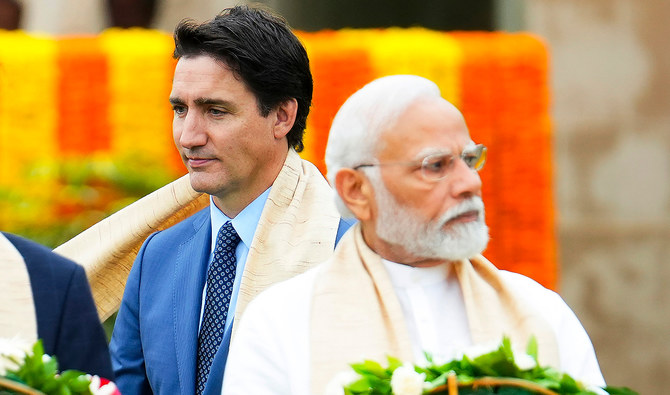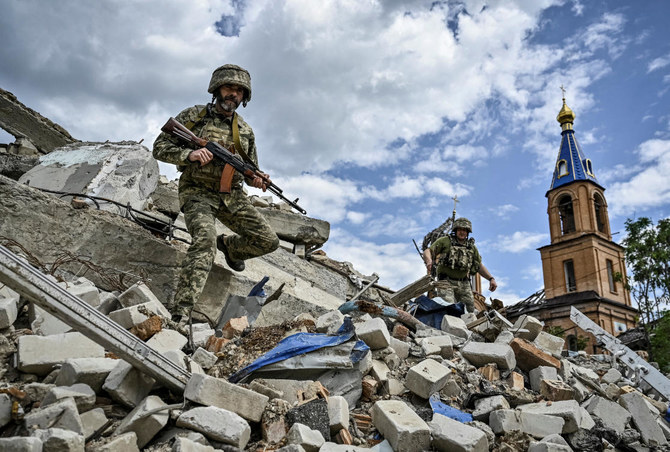NEW DELHI: Canada-India relations have sunk to their lowest point in years as the two countries are swapping accusations and expelling each other's diplomats over the killing of a Sikh separatist leader. Experts said it remains to be seen if it will create a lasting rift between the two U.S. allies, but it's nonetheless an awkward situation for western countries seeking woo New Delhi as a counterweight to China and win his cooperation on the Ukraine war.
Five years ago, Canadian Prime Minister Justin Trudeau captured headlines in India for enthusiastically embracing the country's culture during a weeklong trip with his family. He donned a series of colorful, glittering traditional Indian suits, visited monuments and even received Prime Minister Narendra Modi’s signature bear hug — a sign that their relationship was on the up.
Those days seemed gone for good when Trudeau said Monday that his government is investigating “credible allegations” that India may have been tied to the killing of a Canadian Sikh independence activist in British Columbia in June. India rejected that as “absurd” Tuesday and accused Canadian diplomats of interfering in “internal matters.”
New Delhi’s anxieties about Sikh separatist groups in Canada have long been a strain on the relationship, but the two have maintained strong defense and trade ties, and share strategic interests over China’s global ambitions.
Signs of a diplomatic rift emerged at the G20 Summit hosted by India earlier this month.
Trudeau skipped the official dinner hosted for the G20 leaders and local media reports said he was dealt a snub when he got a quick “pull aside” meeting with Modi, instead of a sit-down bilateral meeting.
Modi raised concerns that Canada's government was soft on Sikh separatists, according to an Indian statement released at the time. Trudeau's trip ended with even more awkwardness when his plane broke down, forcing him to stay in New Delhi for some 36 hours longer than planned.
On Monday, Trudeau revealed a likely reason for the chill, saying he confronted the Indian prime minister at the summit with Canada's suspicions about an assassination.
Canada has yet to provide evidence of Indian involvement in the slaying of Hardeep Singh Nijjar, a 45-year-old Sikh leader who was killed by masked gunmen in Surrey, British Columbia.
India, though, has accused Canada for years of giving free rein to Sikh separatists, including Nijjar who was a leader in what remains of a once-strong movement to create an independent Sikh homeland, known as Khalistan.
While the active insurgency ended decades ago, the Modi government has warned that Sikh separatists were trying to stage a comeback and pressed countries like Canada, where Sikhs make up more than 2% of the population, to do more in stopping them.
In June, India summoned Canada's highest diplomat to complain about a parade float seen in a small Canadian town that commemorated the assassination of Indian Prime Minister Indira Gandhi at the height of the Sikh insurgency. In late 2020, it did the same to complain after Trudeau made sympathetic comments about protests by farmers from Punjab, where Sikhs are a majority.
The issue never dominated ties between the two countries, but some experts say that could change.
“While both don’t want a rupture in relations, they’re going to have trouble finding offramps after events of the last few days,” said Michael Kugelman, director of the Wilson Center’s South Asia Institute.
The tensions likely sparked Canada to recently halt talks with India on a new trade deal, a sign that “their relationship isn’t as resilient and foolproof as many would like it to be,” added Kugelman. The two countries are relatively minor trading partners, but proponents had argued that a trade deal could boost jobs and GDP for both.
The unsavory allegations could also hurt Modi's growing soft power in the west, Kugelman said, but values and morals don’t necessarily drive foreign relations.
“We’re not going to see the Western democracies try to remove India from their strategic calculus, especially in terms of countering China. The strategic convergences are too strong,” he added.
So far, allies like the United Kingdom and the United States have expressed concern about the killing, but have stopped short of commenting on India’s alleged role.
On Tuesday, Australia’s Foreign Minister Penny Wong said Canada’s allegations were “concerning,” and that Canberra was monitoring developments and had raised the issue with India.
Some Indian experts said Modi’s confrontational response to the allegations reflects a pattern of hyping separatist threats to consolidate its Hindu nationalist base.
“It is unprecedented, but not entirely unexpected, because of the way this government has held its foreign policy hostage to domestic politics,” said Sushant Singh, a senior fellow at the Centre for Policy Research in India.
Modi has sought to cast India as a rising global power, adept at juggling ties with developing countries and Russia on one hand, and the West on the other.
Singh said the incident will “put India under pressure and it will have to devote a lot of energy to contain that fallout.”
A number of Indian news sites and TV channels ran headlines like: “India trashes Canada’s big charge” or referred to India’s “savage reply” to Canada. Social media users criticized Trudeau for not taking India’s separatism concerns seriously.
Some Indian commentators have also been skeptical over the allegations, saying Trudeau didn’t offer hard evidence and suggested he was trying to appeal to Sikh constituencies for political points.
But to many other Indians, especially students, Canada is more relevant as an attractive destination overseas. In 2022, the country had nearly 300,000 Indians students pursuing higher education.
Prabhjit Singh, a 21-year-old student in New Delhi, said he hoped the strained ties don’t affect the dreams and careers of young Indians like him. “Many people from India go to Canada for study and work — I also want to go there for a better future. I hope peace prevails between the two countries,” he said.




















